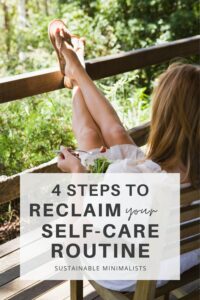Late Stage Capitalism And Self Care
Underneath all of life’s burdens, many of us experience the triple losses of time, freedom, and mental space. Self-care is generally touted as burnout’s antidote, and advocates argue that regular self-care routines lower stress, anxiety, and frustration while simultaneously improving energy, concentration, and overall life satisfaction. Sounds wonderful, right? But there’s a problem to #selfcare culture: In amidst capitalism, anything and everything becomes a sellable product or service, self-care included.
These days the term ‘self-care’ is often used synonymously with spa days, last-minute getaways, and other actions that require a financial transaction. In this article we attempt to answer this very 2022 question: Is self-care a commodity that is best purchased, or is the idea that taking care of ourselves must be outsourced the epitome of late stage capitalism?
Here are 4 steps to reclaim your own self-care routine:
Powered by RedCircle
Step 1. Expand upon your notion of self-care.
Our consumerist society has framed self-care in terms of spa days and manicures and heck, Botox.
But if we break the word down to its roots, self-care is literally anything you do to take care of your physical, mental, intellectual, and emotional selves.
Said another way: self-care is anything you do to take care of yourself.
- Brushing your teeth is self-care.
- Going for a walk is self-care
- Going for therapy is self-care.
- Budgeting your money is self-care.
The constructed definition of self-care adds in messaging we’re exposed to through our culture, through social media, through marketing professionals, and more.
The constructed definition is buffered and therefore, construed. Oftentimes, it’s misconstrued.
A spa day is definitely self care, but you can’t go to the spa everyday. If we only look at self-care as big, bold, and luxurious actions, we’re going to feel inadequate; we’re also going to go broke.
By expanding upon our definition on what self-care is (and by not pigeonholing ourselves into society’s constructed definition) what we’re really doing is freeing ourselves from that inadequacy that comes with adopting the narrow definition.
Remember: Self-care is anything you do to nourish your mind, your body, your soul. (Yes, brushing your teeth is self care!)
Step 2. Understand the ways capitalism contorts our notions of self-care.
Where we live and the messages we hear impact the way we think about self-care. It’s just the way it is.
We’re sold the idea that we “need” this service or this product in order to unwind.
If you don’t believe me, start paying attention to advertisements by looking at them through a critical lens. A great example? Mom wine culture. Alcohol advertisements that specifically target mothers make the argument that moms don’t just want wine, moms need wine to get through each day.
We’re told that the answer to every problem is to spend money, and we’re told we need to spend money to take care of ourselves. When we unconsciously accept our culture’s narrow definition of self-care as a commodity that has to be purchased, what we’re really doing is denying ourselves of both the opportunity the satisfaction that comes with meeting our own needs. That comes with taking care of our selves. (Remember: SELF-care.)
In a capitalist society, corporations have everything to gain when we live our lives in ways that make us think we “need” their product or service for self-care, and that’s because marketing pros know that if we’re unhappy many of us will attempt to feel better by spending money.
If we accept the idea that the notion self-care as something that must always be purchased is false, then let’s stop for a moment and sit with the absurdity of such falsity:
Can we really not take care of ourselves without spending money? Are we that helpless? Are we that daresay pathetic, even, that we require the help of products and services that we must always pay for to take care of our fundamental needs?
This is absurd, and it’s late capitalism personified.
What’s Late Stage Capitalism?
Late Stage Capitalism is a term that describes the collective absurdities capitalism creates. Some examples:
- Needing to pay to take care of ourselves? Absurd.
- Buying $300 jeans with fake mud on them? Absurd.
- Tiffany’s “eco-friendly” silver straw that retails $375? Absurd, and also a real-life example of Late Stage Capitalism.
So are mani/pedis bad? No, of course not. Taking care of your nails is taking care of yourself, and taking care of yourself is self-care.
But paying for self-care is indeed a capitalist construct. And while we can spend money on self-care, we don’t have to. When we spend money we don’t have on what society tells us is self-care we may perhaps be doing self-harm if we put ourselves into debt.
Powered by RedCircle
3. Know that self-care tends to follow into one of 4 categories: physical activity, creativity, relaxation, and learning.
Self-care activities tend to fall under one of four umbrellas:
1. Learning
Examples: listening to a podcast, reading a good book, watching a documentary, visiting a museum
2. Physical Activity
Examples: gardening running, going for a walk with your dog, moving your body
3. Creativity
Examples: coloring, redecorating, cooking without a recipe, knitting
4. Relaxation
Examples: going to the spa, getting your nails done, relaxing on the couch, meditating, taking a nap
All 4 categories are important, and no one category is preferable over any other. Every person naturally gravitates to one or two of these categories: For me, I lean into physical activity to let off steam; I also tend to prioritize relaxation.
That said, I do receive benefit from creativity and learning when I do them.
I invite you to lean into one of the other categories that you don’t necessarily prioritize. Leaning into other ways to practice self-care without spending money is a way for you to take back your power; it’s also of course a great way to save money.
Step 4. Allow your mind to wander.
What would it look like to create a life you don’t need to unwind from? A life you don’t need to escape from? What are the first steps for you to make that life, that life of enough, a reality?
I’m personally not sure of the answer, but it’s something I’ve begun thinking about. What is within your control? What little steps can you make right now in the direction of creating that life?
The final word:
Self-care is important. It’s necessary. But let’s not forget about communal care.
The messaging we tend to receive in a capitalist society is self-centered: Me first, you later.
But communal care – helping others who need support, being a better neighbor, shepherding others through crises – is self care. And certain types self-care – the types that truly nourish our physical, mental, and emotional selves – they in turn are forms of communal care:
When you’re physically strong, you can help your elderly neighbor move his couch to the basement.
When you’re emotionally centered, you can be the best listening ear possible for a friend.
The best part? Communal care lies outside of capitalism’s reach. (When you help your neighbor, there’s no opportunity there for someone to make a buck off him or you!)
Just like our planet’s ecosystem, we are all fundamentally connected. Let’s not forget that.
Stay in-the-know!
Sign up for monthly eco-minimalist inspiration.


